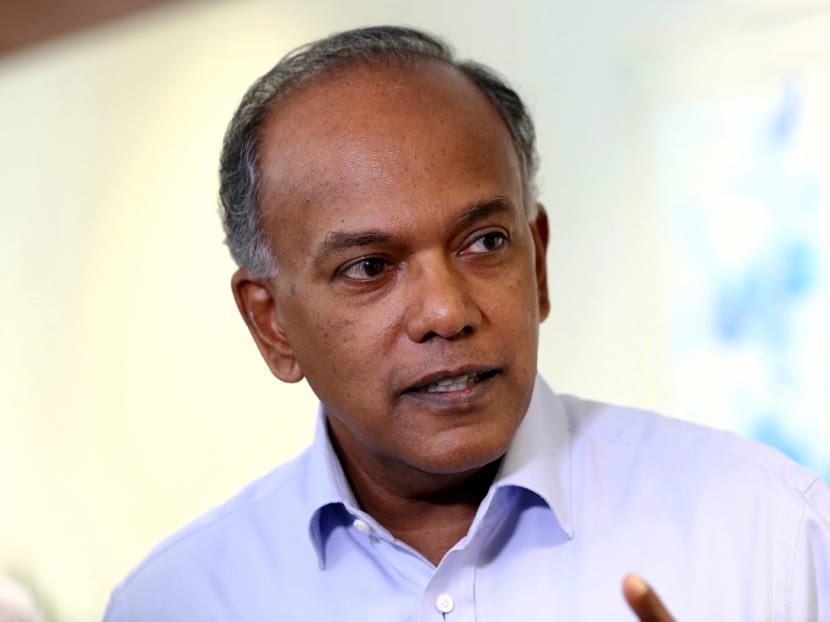Bail provisions and conditions to be tightened: Shanmugam
SINGAPORE - The authorities will be tightening provisions and conditions for posting bail, said Home Affairs Minister K Shanmugam on Thursday (Feb 22).

The authorities will be tightening provisions and conditions for posting bail, said Law and Home Affairs Minister K Shanmugam on Thursday (Feb 22). Photo: Nuria Ling/TODAY
SINGAPORE — The authorities will be tightening provisions and conditions for posting bail, Law and Home Affairs Minister K Shanmugam said on Thursday (Feb 22).
Jumping bail will also be made an offence under proposed wide-ranging changes to the Criminal Procedure Code (CPC), he told reporters on the sidelines of a visit to the Police Cantonment Complex.
Commenting on the case of former City Harvest Church’s former fund manager Chew Eng Han, who was charged on Thursday for trying to escape to Malaysia a day before starting his jail term, Mr Shanmugam said: “It may come as a surprise to many that jumping bail is not in itself an offence, because you’ve put up bail and you lose your bail. But we’re going to make that an offence.
“There will be stricter criteria if you want to get bail… These changes, you will see.”
The changes to the bail regime, to be introduced next week in Parliament, were not the result of Chew’s actions, but issues that he has been deliberating even before Chew tried to abscond, he added.
Earlier this month, Chew, who has two children aged 17 and 27, was allowed to defer the start of his jail term to Feb 22 to spend Chinese New Year with his family.
Mr Shanmugam explained that when it is Christmas, Chinese New Year or another festival, and the people celebrating the occasion were sentenced just before the period, the practice has been to “give and take” so as to allow them to spend the holiday with their family before serving their sentences.
“It’s in the spirit of humanity. But then there are people who will take advantage of that... I’ve said to my people, the police did exceptionally well in (Chew’s) case,” he said.
In general, police resources should not be spent “keeping track of every single (offender out on bail) all the time and monitoring all their activities”, he added. They should be “focused on counterterrorism and solving crimes”.
CHANGES ARE ‘TIMELY’
Among other changes to be tabled in Parliament, the Ministry of Home Affairs is also looking into electronically tagging those who are on bail. Such monitoring will allow the authorities “to put more people outside”. “But we will look at that and see how it can be done,” Mr Shanmugam said.
Lawyers interviewed by TODAY generally agreed that the proposed changes to the bail regime will be a step in the right direction.
Mr Sunil Sudheesan, president of the Association of Criminal Lawyers of Singapore, pointed out that only “the most serious cases” are considered non-bailable offences, such as murder and capital drug cases.
Even then, some offenders can secure bail when they commit non-bailable offences, such as aggravated cheating. Bail is always evaluated on a case-by-case basis, he said. The proposed changes will thus “tighten things up”.
“Some people genuinely forget or mishear the date (of their court hearing), and there are a number of people who got burnt this way. I hope the changes don’t affect too many law-abiding citizens,” Mr Sunil said.
Criminal lawyer Josephus Tan said that the amendments would be “very timely”, given that those who jump bail do not get penalised, but their bailors might be, in the form of forfeiture of the bail amount or jail time.
“If you ask me, there is a lacuna… essentially, you’re punishing the person who guarantees (the bail) or acts as the bailor, but you’re not punishing the person who jumps bail,” Mr Tan said.
However, one legal professional believes that the present bail regime is good enough on its own. Police officer-turned-lawyer Luke Lee said that what is in place now has acted as a successful deterrent in most cases, because it places a “very heavy financial punishment” on the bailor who is most often a loved one.
“The most important question to assess (whether an offender should get bail) is, is he a flight risk? That can be seen quite objectively. I really doubt we need to legislate this,” Mr Lee said, adding that he is concerned his clients may find it harder to secure bail under the stricter conditions.
“The basic rule is, even though it may not be respected very much in Singapore, you’re presumed innocent until you’re convicted. We have a problem with the prosecution’s stand on that.”






